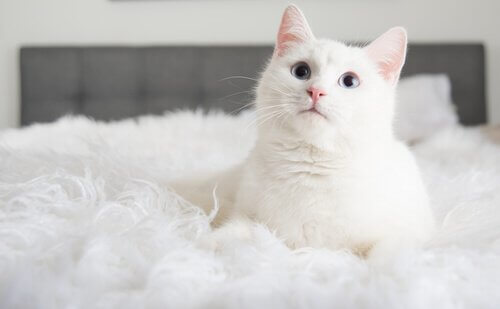Does Music Affect Cats Like It Does Dogs?

They say that music feeds the soul because it has enormous benefits for our health. This is also true in the case of dogs since there are dozens of studies that prove this. The question comes up about cats since there are many fans of these animals. Is music useful and beneficial for cats as well? In other words, “Does music affect cats?”.
The answer is “yes”. We’re going to tell you all about the benefits for felines in this article below. Luckily, there’s even music created especially for cats.
What is the auditory system like in cats?

Every cat owner knows that kitties don’t like loud noises. But still, maybe it’ll surprise you when noticing how they get used to a soft melody. This is because it affects their brain.
A cat’s hearing is much more developed than that of a human. It’s formed by two independent inner ears that can capture sound. There are 20 auditory muscles that can make necessary movements to be able to separate sounds that are emitted simultaneously.
Due to this, cats are able to hear and perceive sounds that humans can’t.
An experiment that shows the effect of music on cats
Hermann Bubna, a professor at the University of Vienna, is an expert in animal conduct. He carried out an experiment with hundreds of cats. The purpose was to prove that for the most part, drugs could be substituted with relaxing music.
For 5 days, Dr. Bubna recorded the behavior of cats that listened to different types of music. When the cats liked the music, they kept quiet and calm. However, if the music was unpleasant to them, they left to get away from it.
Almost all of the cats behaved the same way. For example, the fast music that had low masculine voices made them calm and more relaxed. Because of their behavior, Dr. Bubna arrived at the conclusion that music with a particular rhythm could cause this relaxed behavior in cats.
He also concluded something else that was interesting. The emotional state of the owner can increase the effect music has on a cat. For instance, if an owner is calm, he transmits this mood to his cat, which will demonstrate the same behavior.
It’s important to remember that learned habits are necessary. This means that if from a young age, a cat is used to listening to music, this type of therapy will be helpful in stressful situations when she is older.
Music for cats

So, what’s the best music for cats? It’s whatever type of classical music that you notice has a calming effect on your kitty. In fact, musicians have actually created music especially for felines, which we’ll talk about below.
Experts did a study in Wisconsin on the therapeutic effect of music on cats. The researchers found that the natural sounds of cats are an octave higher than those made by people.
Therefore, they decided to create music based on cat sounds. For example, they included rhythms of purring and sucking sounds. In order to test this experiment, they had 47 cats listen to the music of Bach. But there was no reaction at all.
Comparatively, listening to the sounds of cats, it all changed. All of the cats were enthusiastic and excited to hear the cat sounds and they even got closer to the speakers to rub their little noses against them.
Researchers believe that with this experiment they can prove that our pets will no longer need medication in order to relax and feel calm.
To answer the question, “Does music affect cats like it does dogs?” The answer is “yes”. Music does, in fact, have benefits for cats as well as for dogs. We just need to choose the right kind of music.